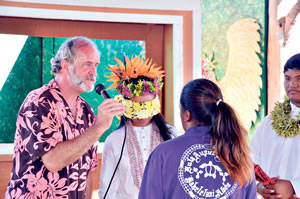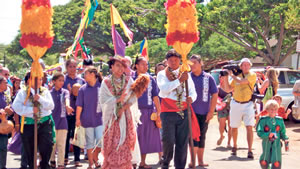Celebrating Princess Ka‘iulani’s Life

Mark Jeffers plays The Mystery Person Game with Princess Ka‘iulani (Cheyenne Kanahele) at the festival. Robert Zelkovsky photo
The Storybook Theatre of Hawaii executive director Mark Jeffers throws a birthday party for the princess, whom he sees as a role model for Island keiki
Princess Victoria Ka’iulani was a mature young woman deeply concerned for her people, says Mark Jeffers, The Storybook Theatre of Hawai’i executive director.
The celebration of what would have been her 136th birthday is the reason some 800 to 1,000 people attended the Princess Ka’iulani Story Festival in Hanapepe last month. Directed by Jeffers, the festival was a familyoriented dedication of the princess’s short but meaningful life.
“Children can relate to Princess Ka’iulani more than they can to any other Hawaiian,” he says. “She’s an important figure in a critical time in Hawaiian history, and she is to be emulated. Children can look up to her.”
Born in 1875, Princess Ka’iulani was a child when the Hawaiian kingdom was still strong. However, the kingdom’s strength, as well as her own, deteriorated rapidly when she was a young adult and, shortly before her death in 1899, the Hawaiian Islands were annexed by the United States.
“Her life spans the exact time frame of the overthrow of the Hawaiian monarchy,” says Jeffers. “So we can understand that time frame through her eyes to see what she was going through and her version of what was happening to the kingdom.”
Another reason Jeffers chose to celebrate Ka’iulani’s life is because so often children only learn of her tragic, untimely death.
The niece of King Kalakaua and Queen Lili’uokalani, Ka’iulani was destined to become queen and studied in England several years prior to her return to Hawaii, where she died at the age of 23.
The princess succumbed to complications of fever from a thyroid condition that was worsened by a bad cold caught after riding horseback in a storm on the Big Island.
Though her life was abbreviated, she was “wellprepared and got the job done,” says Jeffers, who has read many letters written by the princess that were published in books and are housed in the Bishop Museum and Hawai’i state archives.

Princess Ka‘iulani leads her festival parade through the streets of Hanapepe town. Chelsea Crapser photo
She was brave, studied hard, was known to be very charitable and even brought surfing to Europe she was a role model. Teaching children about historical figures is important in their development.
“It’s important that the host culture is held with the most esteem,” says Jeffers. “Young people today don’t necessarily respect where they came from or their ancestors; they think they created the world, and they didn’t. It’s important that children have a sense of community through the past and through cultural experiences.”
Students from Kula Aupuni Ni’ihau A Kahelelani Aloha represented the living cultural aspect of the event by singing, dancing, making lei and chanting in Hawaiian for attendees.
Kamehameha School also was on board and helped tell Ka’iulani’s story with a scavenger hunt, song and story contest.
“There were activities where young people could … understand cultural experiences,” says Jeffers, who hopes to expand the festival to a two-day annual event.
Jeffers enjoys sharing Hawaiian history, and since the 1970s has been encouraging keiki to learn through storytelling. He performed a one-man show in the mid-1990s for children and adults in Hawai’i and on the Mainland about the life of writer Robert Louis Stevenson, who met Ka’iulani and wrote a poem about her, The April of Her Age.
“Children loved the idea of a storyteller and princess,” says Jeffers, who titled the show, “The Poet and the Princess.”
Keiki also love the idea of birthday parties, which could be one of the reasons why the event was such a success. Not only were residents from around the island in attendance, visitors also took time to stop by and wish the princess a happy birthday.
Jeffers, who started planning the festival back in May, says family events with activities such as these are crucial to a healthy community.
“That way families can feel a big part of things going on,” he says. “Families in the Pacific Islands are the strongest unit. It’s not government, it’s not institutions or businesses, it’s families.
“Families make the decisions about what’s happening and what happens on the island, and that’s what Kaua’i should be. We should be a family place. Really, the children are the future, and we have to hand them something that’s worthwhile.”



